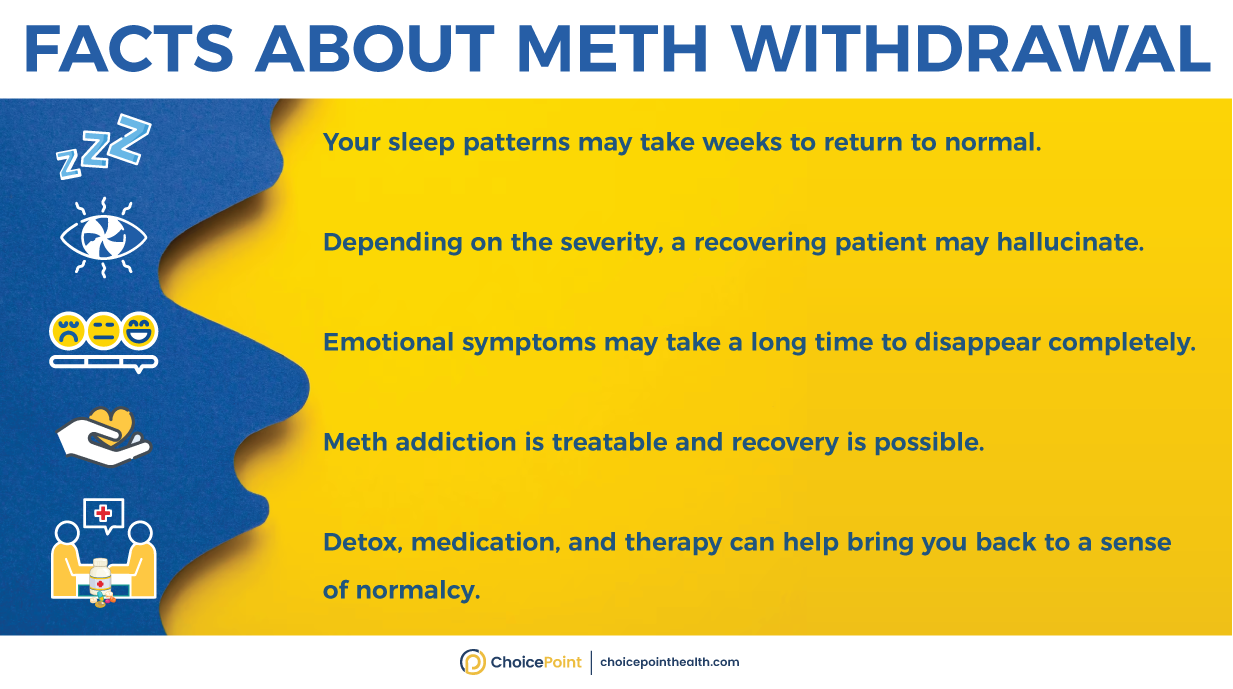Meth is classified as one of the most deadly drugs in the world. Despite that, the use of meth has spiked about three times in recent years. In 2021, 106,000 people died due to overdose, and stimulants like meth were responsible for approximately 32,537 deaths in the US. The above figures show that Meth abuse can be life-threatening, but did you know that acute meth withdrawal can kill you if unassisted? Yes, you heard that right. The purpose of explaining this unsettling news is to inform readers that it is extremely important to recognize meth withdrawal symptoms and initiate recovery from medical experts to avoid its risks.
Do you need help with meth abuse? Don’t hesitate to seek professional help. Call us at 844.445.2563 to get more information. You may fill out this form to get registered as well.
Table of Contents
Destructive Consequences of Meth Abuse: Why to Remain Abstinent
Meth is a powerful CNS stimulant that alters brain chemistry, which can lead to dire consequences. Unlike other potent drugs like fentanyl, meth has limited medical uses, and its use is heavily regulated due to its high potential for abuse and addiction. Here are some of the reasons why a person should stay away from meth:
- Impairment in Cognitive Functions
- Harmful Meth Withdrawal Symptoms
- Developing Mental Health Disorders due to Meth Addiction
Evidence suggests that meth abuse can affect cognitive functions such as decision-making. A similar study found that persistent abuse can result in the development of chronic relapsing disorder, which means that the more a person consumes the drug, the easier it is to rebound. Chronic abuse of meth can result in several withdrawal symptoms, which can be physically and mentally crushing. Therefore, if you or someone you know struggles with meth addiction, getting help as soon as possible is important.
A person who abuses meth for a long time becomes more prone to mental health issues such as paranoia or hallucinations. Moreover, meth can aggravate pre-existing mental health conditions such as depression or anxiety.
Meth Withdrawal Symptoms: All You Need to Know
Meth, being a potent and fatal drug, can pose mild to severe withdrawal symptoms, depending on a variety of factors, such as:
- The longevity of meth abuse
- Dosage
- Administration route
- History of meth abuse
Acute Meth Withdrawal: Symptoms and Timeline
A person may begin to experience acute meth effects within 24 hours of the last dose, lasting up to two weeks. These initial symptoms will likely subside within the next 7 to 14 days. Acute meth withdrawal symptoms include:
- Restlessness and anxiety
- Persistent fatigue
- Disturbances in sleep
- Irritability
- Cravings
- Reduced energy
Long-term Meth Withdrawal: Symptoms and Timeline
Long-term symptoms are also classified as post-acute withdrawal syndrome (PAWS). It is estimated that about 75% of psychotropic drug users experience PAWS. If you are wondering how long meth withdrawal lasts, the answer is that it may last for about two or three weeks once the initial withdrawal phase is over. The symptoms include:
- Depression and severe anxiety
- Self-harming thoughts
- Chronic fatigue
- Irritability and drowsiness
- Changes in appetite
It is noteworthy that meth withdrawal is extremely uncomfortable and dangerous, so professional help from a DEA-certified doctor is necessary. Going “cold turkey” can lead to complications such as aggravating self-harming tendencies.
Avoid Going “Cold Turkey”: Quit Meth Safely
The safest and best way to get off meth is to undergo professionally tailored treatments. Because you can become physically and psychologically dependent on meth, it can start affecting a person on both levels. Therefore, if you are wondering why certified doctors should manage meth withdrawal symptoms, the answer is that the above-mentioned potential dangers can be minimized and even eliminated through a comprehensive treatment program.
Need professional help to quit meth? You can choose meth addiction treatments by calling us at 844.445.2563 or filling out this form. You can check out our telehealth services to undergo treatment from the comfort of your home.
Manage Meth Withdrawal from a Suitable Rehab for Meth Addiction
Another important aspect of addiction is looking for a suitable rehab. But what qualifies as a decent rehab? :
The following are some of the parameters that determine whether you should look for rehab to manage meth withdrawal or not:
- Personalized treatments: A rehab that offers customized addiction treatments guarantees better recovery.
- Specialized Interventions: Treatments for co-occurring disorders are necessary because mental health can aggravate addiction and vice versa.
- Therapeutic Support for Patients: A rehab offering a range of therapies should be chosen to ensure that every aspect of addiction is catered to.
- Diverse Options: A rehab should have various treatment options because everyone is different.
- Serves the Underserved: A good rehab has specialized programs for communities usually overlooked or stigmatized, such as LGBTQ.

What Are Meth Withdrawal Symptoms?
ChoicePoint to the Rescue!
ChoicePoint is a specialized addiction treatment center that tries to remain updated with the latest interventions and technologies. To keep up with the needs of patients, we offer telehealth and in-person services. You may visit our facility located in Fairlawn, NJ.
A. Medical Detox to Assist Meth Withdrawal
Detoxification is when doctors ensure that meth or any other substance is removed from the body medically. Detox aims to address the following:
- Withdrawal symptoms
- Recurrent drug cravings
- Psychological disturbance during detox
You may undergo detox by visiting our facility situated in Fairlawn, NJ. Detox is very effective for meth withdrawal symptoms.
B. Dual-Diagnosis Treatment Program
Many meth users eventually develop paranoia and psychosis. Some preexisting conditions, such as meth or depression, can also be aggravated by meth abuse. This is where a patient should opt for a dual diagnosis treatment program. A dual-diagnosis treatment program intends to solve the following problems:
- Underlying mental health condition
- Addiction stemming from existing conditions and vice versa
Remember that not every drug rehab will offer specialized co-occurring disorder treatment. You must look for an addiction treatment center specializing in it.
To book an appointment with our doctors for a dual-diagnosis treatment program, you may contact us at 844.445.2563 or fill out this form.
Levels of Care at ChoicePoint
There are many layers to addiction, and the severity may also differ. So, here are the levels of care at our rehabilitation center:
- Ambulatory Detox (ASAM Level I-D and II-D)
- Outpatient Treatment (ASAM Level care of I)
- Intensive Outpatient Treatment (ASAM Level of care 2.1)
- Medication-Assisted Treatment (Suboxone, Vivitrol, Buprenorphine)
- Targeted Therapy (CBT, DBT, Group, and Individual therapy)
- Dual-Diagnosis for co-occurring disorder
Final Takeaway on Meth Withdrawal Symptoms
Finally, recognizing and managing meth withdrawal symptoms is critical for those attempting to overcome their addiction to this highly addictive substance. Meth withdrawal can be challenging and uncomfortable, but some effective strategies and treatments can help individuals cope with the symptoms and successfully navigate the recovery process. Therefore, seeking help from a licensed professional is essential to achieve this. Doing it alone is not only unsettling but also extremely dangerous.
Medical Disclaimer:
ChoicePoint aims to improve the quality of life for people struggling with substance use disorder and mental health issues. Our team of licensed medical professionals research, edit and review the content before publishing. However, this information is not intended to be a substitute for professional medical advice, diagnosis, or treatment. For medical advice please consult your physicians or ChoicePoint's qualified staff.









Review Recognizing and Managing Meth Withdrawal Symptoms.